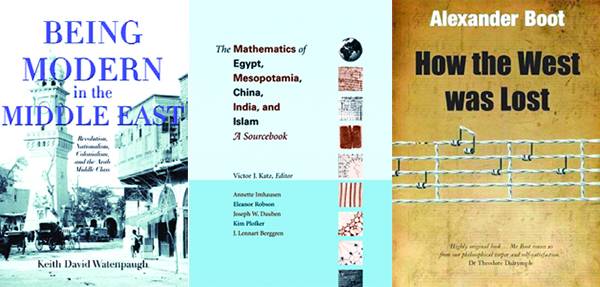

Slaves of the Shah: New Elites of Safavid Iran
Sussan Babaie, K. Babayan, Ina Baghdiantz-McCabe, Mussumeh Farhad
I.B.Tauris & Co Ltd (2004)
Rs6,553
The Savafid dynasty represented, in political, cultural and economic terms the pinnacle of Iran’s power and influence in its early modern history. The evidence for this - the creation of a nation state, military expansion and success, economic dynamism and the exquisite art and architecture of the period - is well-known. What is less understood is the extent to which the Safavid success depended on - and was a product of - a class of elite originating from outside Iran: the slaves of Caucasian descent and the Armenian merchants of New Julfa in the city of Isfahan. It was these groups, bolstered by Shah Abbas the Great (1589 - 1629) and his successors, who became the pillars of Safavid political, economic and cultural life. This book describes how these elites, following their conversion to Islam, helped to form a new language of Savafid absolutism. It documents their contributions, financed by the Armenian trade in Safavid silk, to the transformation of Isfahan’s urban, artistic and social landscape.
The insights provided here into the multi-faceted roles of the Safavid royal household offer an original and comprehensive study of slave elites in imperial systems common to the political economies of the Malmuk, Ottoman and Safavid courts as well as contributing to the earlier Abbasid, Ghaznavid and Saljuq eras. As such this book makes an original and important contribution to our understanding of the history of the Islamic world from the 16th to the 18th centuries and will prove invaluable for students and scholars of the period.
Sussan Babaie is the Assistant Professor of Islamic Art History and Kathryn Babayan is the Assistant Professor of Iranian History and Culture, both at the University of Michigan. Ina Baghdiantz-McCabe is the Assistant Professor of Armenian History at Tufts University. Massumeh Farhad is the Associate Curator of Islamic Art, Freer and Sackler Galleries, Washington D.C.
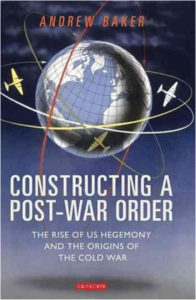
Constructing a Post-war Order: The Rise of US Hegemony and the Origins of the Cold War
Andrew Baker
I.B. Tauris & Co Ltd. (2011)
Rs9,283
The years 1942 to 1946 saw the acceleration of World War II, its conclusion and the construction of a post-war order that was to culminate in the Cold War. Andrew Baker here examines the expansion of US political and economic power and hegemony during this period, and the extent to which smaller states, particularly Australia, New Zealand, Canada and South Africa, contested this expansion. Through successfully outlining and defending their own notions of sovereignty, property and commercial rights, they were able to a make a significant contribution towards fashioning a post-war framework more conducive to states than empires. This analysis of the period immediately after World War II will appeal to researchers of history and international relations, as well as those interested in the political economy of the post-war world.
Andrew Baker is Lecturer in History at the Universities of Hertfordshire and Buckingham. He holds a DPhil from the University of Oxford.
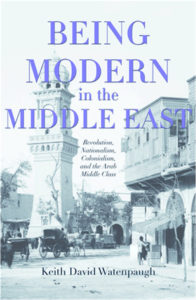
Being Modern in the Middle East: Revolution, Nationalism, Colonialism, and the Arab Middle Class
Keith David Watenpaugh
Princeton (2012), Rs4,356
In this innovative book, Keith Watenpaugh connects the question of modernity to the formation of the Arab middle class. The book explores the rise of a middle class of liberal professionals, white-collar employees, journalists, and businessmen during the first decades of the twentieth century in the Arab Middle East and the ways its members created civil society, and new forms of politics, bodies of thought, and styles of engagement with colonialism.
Discussions of the middle class have been largely absent from historical writings about the Middle East. Watenpaugh fills this lacuna by drawing on Arab, Ottoman, British, American and French sources and an eclectic body of theoretical literature and shows that within the crucible of the Young Turk Revolution of 1908, World War I, and the advent of late European colonialism, a discrete middle class took shape. It was defined not just by the wealth, professions, possessions, or the levels of education of its members, but also by the way they asserted their modernity.
Using the ethnically and religiously diverse middle class of the cosmopolitan city of Aleppo, Syria, as a point of departure, Watenpaugh explores the larger political and social implications of what being modern meant in the non-West in the first half of the twentieth century.
Well researched and provocative, Being Modern in the Middle East makes a critical contribution not just to Middle East history, but also to the global study of class, mass violence, ideas, and revolution.
Keith David Watenpaugh is an historian and Professor of Human Rights Studies at the University of California, Davis. He is the author of two major books in Modern Middle East History, including Being Modern in the Middle East (Princeton: 2006) and Bread from Stones: The Middle East and the Making of Modern Humanitarianism (California: 2015).
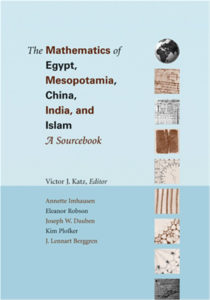
The Mathematics of Egypt, Mesopotamia, China, India, and Islam: A Sourcebook
Ed. Victor J. Katz
Princeton (2007)
Rs9,335
In recent decades it has become obvious that mathematics has always been a worldwide activity. But this is the first book to provide a substantial collection of English translations of key mathematical texts from the five most important ancient and medieval non-Western mathematical cultures, and to put them into full historical and mathematical context. The Mathematics of Egypt, Mesopotamia, China, India, and Islam gives English readers a firsthand understanding and appreciation of these cultures’ important contributions to world mathematics.
The five section authors — Annette Imhausen (Egypt), Eleanor Robson (Mesopotamia), Joseph Dauben (China), Kim Plofker (India), and J. Lennart Berggren (Islam) — are experts in their fields. Each author has selected key texts and in many cases provided new translations. The authors have also written substantial section introductions that give an overview of each mathematical culture and explanatory notes that put each selection into context. This authoritative commentary allows readers to understand the sometimes unfamiliar mathematics of these civilizations and the purpose and significance of each text.
Addressing a critical gap in the mathematics literature in English, this book is an essential resource for anyone with at least an undergraduate degree in mathematics who wants to learn about non-Western mathematical developments and how they helped shape and enrich world mathematics. The book is also an indispensable guide for mathematics teachers who want to use non-Western mathematical ideas in the classroom.
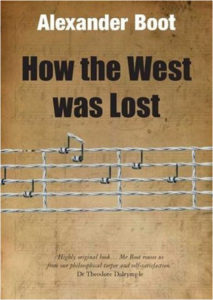
How the West Was Lost
Alexander Boot
I.B.Tauris (2006)
Rs3,822
What made the West ‘western’? And has Western civilisation found modernity but lost itself? This provocative and stimulating polemic argues that the modern world has destroyed western culture and civilisation without gaining anything in return, leaving contemporary man with a spiritual and cultural gap that no amount of material wealth can fill. This is a brave and challenging attempt to explain how and why this has happened and present a new concept of modern history for our complacent times..
Praise for ‘How the West was Lost’: “There are many wise ideas in this book,”says Roger Scruton, writer and philosopher. “A startlingly clear analysis of why we have become who we are, written with such admirable clarity and wit that news of humanity’s defeat seems almost bearable. No one who claims to know anything should open their mouth in public without reading it,”wrote Fay Weldon. “Highly original…an extremely important argument even for those who have no religious belief, and Alexander Boot puts it more unflinchingly, more courageously, than anyone else,” said Theodore Dalrymple, author of Life at the Bottom and Our Culture, What’s Left of It. “Those reading Alexander Boot’s vigorous and witty assault on the modern superstitions of progress and science will never see the world in the same way again. A refreshing and original voice,” wrote James Le Fanu, Telegraph columnist and author of The Rise and Fall of Modern Medicine and Why Us?
Alexander Boot has lectured on English literature, wrote art and film criticism, and made a nuisance of himself with the authorities. Pursued by the KGB, he emigrated in 1973, first to the USA and then, in 1988, to the UK. For a long time he combined writing for various publications with a successful business career. When this became difficult, he retired as company director in 2005 and began to write full-time. Boot is the author of How the West Was Lost (2006), God and Man According to Tolstoy (2009), The Crisis Behind Our Crisis (2011), How the Future Worked (2013), Democracy as a Neocon Trick (2014) and co-author of A Nation That Forgot God (2010). He divides his time between London and Burgundy, working on his next book.

